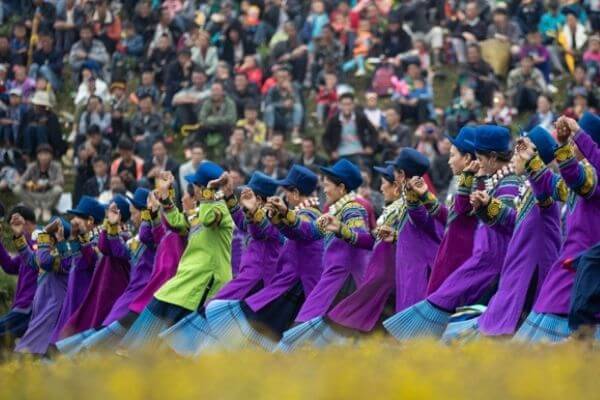
(Picture from China's State Council)
A closer look at Degu Mediation of the Yi Chinese people reveals how the traditional mediation mechanism evolves from functioning beyond the national framework to being incorporated into the judicial system.
In China, apart from the people’s mediation and court-connected mediation, which are introduced in our earlier post, there is also another type of mediation that is beneficial to improve China’s mediation mechanism.
Such kind of mediation mainly refers to the traditional mediation mechanism commonly operated in China’s ethnic minority regions, such as Degu mediation of the Yi Chinese people. Like other traditional cultures, it is also faced with the impact brought by modernization.
Zhang Bangpu (张邦铺), professor of the Faculty of Law of Xihua University, has been studying this mediation mechanism of the Yi people for decades, and has published a dozen of academic papers. Professor Zhang is devoted to researching ethnic minorities’ customary laws and dispute resolution. Highlights of his opinions on the mediation mechanism of Yi people are summarized below.
I. General Information of the Yi People
The Yi people are ranked the sixth largest ethnic minority in China, who live mainly in the mountainous areas of southwest China, and a small number of them live in Southeast Asia such as Vietnam and Laos. As of 2010, its total population is about 9 million, of which more than 8.7 million live in China.
The Yi people is one of the oldest ethnic groups in China, which has a long history as the Han people, the largest nationality in China. Yi people follow the ancient traditions to live. Although impacted and influenced by modern culture, they still keep a large number of local traditions, which is the reason why the traditional legal culture can be well preserved. [1]
II. Traditional Methods of Dispute Resolution for the Yi People
1. The Yi people are used to resorting to “Degu” for settling their disputes.
Degu is a group of dispute solvers that have naturally evolved among the Yi people in their daily activities. Degu is not appointed via elections, nor granted with such title, but is an identity recognized by people in the region.
According to the Yi tradition, a qualified Degu must be familiar with genealogy, customs, proverbs, myths and folktales of ethnic group, as well as with guiding cases of the past, and must be responsive, eloquent, well-mannered, and impartial. [2]
Relevant researches show that for the cases of Degu mediation among Yi people, the success and execution rates are high while just a small proportion of people reject the mediation result and file lawsuits after mediation. Therefore, Degu mediation has become the first choice for the Yi people.
In 2003, the Intermediate People’s Court of Liangshan Yi Autonomous Prefecture conducted an investigation in the areas inhabited by Yi people in its jurisdiction, finding out that a total of 3,972 civil disputes had occurred in 2002, among which 149 cases were settled in court lawsuits, accounting for 3.75% of the total disputes; 78.2% of the total disputes were settled by Degu under customary law, with the remaining 708 cases were settled through the township, village and administrative organizations.
The investigation also indicated that sometimes the courtroom was quiet, but bazaars outside the courtroom were crowded with dozens or even hundreds of people in settling civil disputes. [3]
Some scholars observe that if some rulings on disputes are rendered simply by a court, they will possibly not be recognized by the parties. The disputes are required to be mediated by Degu before the rulings for dispute resolution can be accepted by both parties, which leads to the situation where Degu enjoys high prestige in the areas inhabited by the Yi people while the court cannot exercise its power smoothly and the court authority is not fully recognized. [4]
2. How does Degu solve disputes
The mediation process of a case generally includes the following steps: the initiation of mediation proceedings, the collection of evidence by Degu, the determination of the time and venue of mediation, the mediation by Degu, collegial consultation, and the closing ceremony, and so on.
First of all, the parties or their family leaders may request the initiation of mediation proceedings, sometimes Degu can also take the initiative to intervene in the dispute to initiate mediation proceedings.
After the case is accepted, Degu will identify and confirm the evidence provided by the parties. In more complicated cases, evidence is collected through a reward model known as the “Leizheza”(累哲扎).
Later, Degu will determine the time and venue for mediation.
Then comes the major part of mediation proceedings.
Degu mediates the parties to the case in accordance with the “back-to-back” principle. In other words, the parties are not allowed to meet and are separated at a certain distance, and they will state the case details to Degu respectively. Degu, however, goes back and forth between the two parties and persuades and educates the parties by using the customary law and precedents of the Yi people, and citing allusions, aphorisms or folk sayings as well.
Thereafter, Degus conduct collegial consultation, develop a mediation or adjudication plan pursuant to customary laws. Once the parties and the family leaders agree on the mediation plan, the mediation enters the final stage, the closing ceremony.
At this step, Degus ask the two parties sitting previously in two separate places to sit together and announce the mediation result. The most prestigious Degu is invited to preach to the parties and their families about the relevant matters and responsibilities of obedience to the mediation, and to educate the parties on morals.
Finally, Degu will ask both parties and the families to carry out banquets for concluding the case, named “Mojiza” (莫吉杂) and “Mojizhi” (莫吉支), which are meant to indicate that the Degus’ ruling is final and that the parties will submit themselves to the mediation result and never go back on their word.
In the closing ceremony of some big cases, there will be a “chicken beating ceremony”, i.e., to wring a chicken to death in public, stating that they will never go back on their word, or otherwise will die just like the chicken. [5]
III. Traditional Dispute Resolution Methods Are Incorporated into Modern Law
1. The Degu mediation of Yi people conflicts with modern society
Traditional customary laws are mainly applied in the Degu mediation. However, many of them are in conflict with modern ideas and principles. For example, the customary law forbids marriage between men and women of different classes, and compensation can be used in lieu of criminal punishment in intentional homicide cases. In addition, some new situations have emerged in social life, which cannot be covered by the old traditional customary law.
The Degu Mediation relies mainly on the power of the family to ensure that Degu’s rulings to be enforced. However, in modern society, the family’s power to manage its members has been gradually weakened, which leads to the weakening of the execution of the ruling of the Degu Mediation. Specifically, in some cases mediated by Degu, the parties will still file a lawsuit to the court, and resolve the dispute in accordance with national laws at last.
As the precedent of Yi customary law, the case mediated by Degu has no written records, and the collection and spread of precedents can only rely on people’s word of mouth. The result of the mediation is an “oral ruling”, with no written records or agreement in writing. In modern society, such oral ruling is too easy to be disobeyed. [6]
2. The modern society incorporates the Degu mediation of Yi people
In some areas, the Degu is being recruited as a qualified mediator recognized by the State. For example, in Ebian Yi Autonomous County of Xiaoliangshan, Sichuan Province, a relatively comprehensive set of proceedings has been established for the appointment of “Degu” as township mediators.
In addition, compared with the traditional Degu mediation, there are some changes in terms of mediation methods and content for the set of proceedings, including: (1) to change the paid mediation to a free one; (2) to change the mediation basis from following only the customary laws of Yi people to integrating national laws and ethnic customary laws; (3) to change the form of mediation agreement from “parol agreement” to “written mediation instrument”.
Besides, Degu will participate in pretrial mediation. The court also set up a specialized Degu mediation workshop to provide public welfare mediation services for the parties involved. This kind of proceeding makes the decision of the Degu mediation to be recognized by the court in the judicial confirmation process, thus can be enforceable just like court rulings. [7]
The above changes aim to ensure the success rate and legitimacy of the Degu mediation for dispute resolution.
References:
[1] 张邦铺.实现彝族民间纠纷(dispute among the people)解决机制与国家法(law of the state)律制度(institution)的良性互动——基于四川凉山彝族地区的实证(demonstration)分析[J].西华大学学报(哲学社会科学版),2012,31(01):80-84.
[2] 张邦铺.论彝族民间调解(make peace)制度(institution)的特点[J].贵州工程应用技术(technique)学院学报,2019,37(05):35-41.
[3] 张邦铺.论彝族民间调解制度的特点[J].贵州工程应用技术学院学报,2019,37(05):35-41.
[4] 张邦铺.实现彝族民间纠纷解决机制与国家法律制度(的良性互动——基于四川凉山彝族地区的实证分析[J].西华大学学报(哲学社会科学版),2012,31(01):80-84.
[5] [1]张邦铺.论彝族民间调解(make peace)制度(institution)的特点[J].贵州工程应用技术(technique)学院学报,2019,37(05):35-41.
[6] 张邦铺.彝族民间调解(make peace)制度(institution)的现代转型[J].西华大学学报(哲学社会科学版),2020,39(03):88-93+114.
[7] 张邦铺.论彝族新型“德古”调解(make peace)——以小凉山彝区“德古”调解为例[J].原生态民族(ethic group)文化学刊,2013,5(01):70-75.
Contributors: Guodong Du 杜国栋









